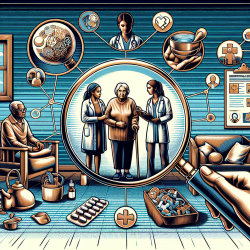Introduction
The COVID-19 pandemic has significantly impacted healthcare delivery, particularly for vulnerable populations such as African Americans with Type 2 Diabetes (T2D). The Texas Strength Through Resilience in Diabetes Education (TX STRIDE) study offers valuable insights into how culturally tailored interventions can be adapted to remote formats. This blog explores how practitioners can leverage these findings to enhance their practice and improve patient outcomes.
Understanding the TX STRIDE Study
The TX STRIDE study, funded by the National Institutes of Health, focuses on diabetes self-management education and support (DSMES) tailored for African Americans. The study emphasizes resilience-building to help participants manage diabetes-related stress, which is often compounded by general life stressors. The emergence of COVID-19 necessitated a pause in in-person activities, prompting a shift to remote intervention using platforms like Zoom.
Key Findings and Implications for Practitioners
The study's qualitative findings provide a roadmap for practitioners looking to transition to remote care:
- Embrace Technology: Despite initial technological barriers, 72.9% of participants successfully transitioned to virtual sessions. Practitioners should consider leveraging telehealth platforms to maintain continuity of care.
- Cultural Sensitivity: The study highlights the importance of culturally tailored interventions. Practitioners should engage in open dialogues about racial discrimination and healthcare mistrust to build trust and improve engagement.
- Resilience Building: Incorporating resilience resources, such as social support and spiritual coping, can enhance patients' ability to manage stress and adhere to treatment plans.
Practical Steps for Practitioners
Based on the TX STRIDE findings, practitioners can take the following steps to improve patient outcomes:
- Implement Remote Learning: Use platforms like Zoom to conduct virtual sessions. Provide training and support to patients to overcome technological barriers.
- Tailor Interventions: Design programs that address the specific cultural and psychosocial needs of African American patients with T2D.
- Foster Resilience: Encourage patients to utilize resilience resources such as social support networks and spiritual practices.
Conclusion
The TX STRIDE study underscores the potential of remote interventions to address health disparities in African American communities. By embracing technology and culturally tailored approaches, practitioners can enhance their practice and support better health outcomes for their patients.
To read the original research paper, please follow this link: Diabetes Self-Management Education and Support Culturally Tailored for African Americans: COVID-19-Related Factors Influencing Restart of the TX STRIDE Study.










